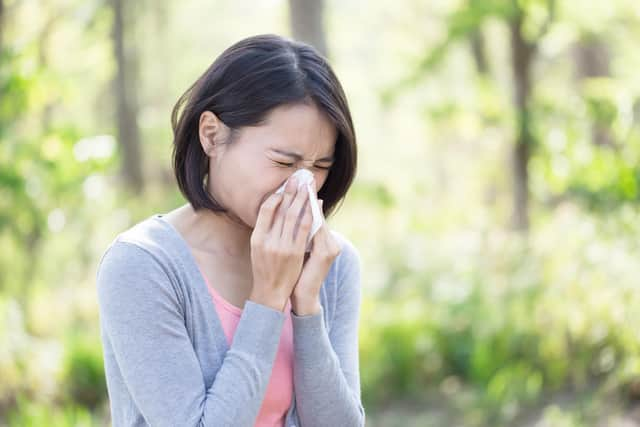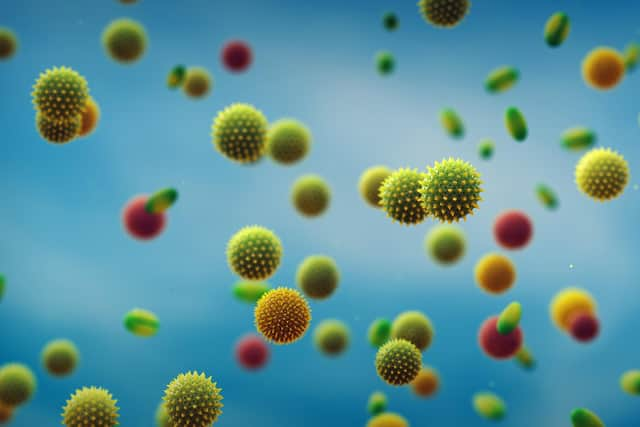Pollen season is coming: Here are some top tips to help keep hay fever at bay if you’re a sufferer
This article contains affiliate links. We may earn a small commission on items purchased through this article, but that does not affect our editorial judgement.
and live on Freeview channel 276
Perhaps you’ve even started experiencing them earlier in the year. Well, chances are you’re not imagining it: evidence suggests that hay fever really might be getting worse, with the pollen season becoming increasingly erratic. All because of climate change.
Chris Newbury (BPharm IP), a pharmacist from the online pharmacy The Independent Pharmacy, offers his tips for dealing with an extended and potentially more symptom-heavy hay fever season.
What is hay fever?


Advertisement
Hide AdAdvertisement
Hide AdHay fever — known scientifically as seasonal allergic rhinitis — affects around 1 in 4 people in the UK each year, and it occurs due to an allergy to pollen and fungal spores. This allergy typically affects the mucous membranes in the eyes and nasal passages, leading to symptoms such as sneezing, a blocked or runny nose, and itchy, watery eyes.
As Chris explains: “Hay fever is a chronic condition for which there’s no ‘cure’, but symptoms typically ease as we get older. It tends to be more common in people with conditions such as asthma and eczema, those who have a family history of hay fever, and those exposed to tobacco smoke from a young age.”
When does hay fever season start?
In the UK, pollen season typically begins around March and lasts until September — with tree pollen usually arriving in mid-to-late-March — though the Met Office suggests that climate change may be extending the pollen season so that it starts earlier, lasts longer, and brings with it an increased concentration of pollen.


This could also mean that hay fever sufferers experience a “double-hit” of symptoms as pollen seasons overlap.
Advertisement
Hide AdAdvertisement
Hide Ad“While many hay fever sufferers are allergic to a single type of pollen,” Chris says, “some are affected by more than one. If the tree, grass, and weed pollen seasons begin to overlap, some sufferers will have little break from their symptoms and could be impacted from February through to October.”
Tips for keeping hay fever at bay ...
While many hay fever sufferers will despair at the prospect of the pollen season becoming increasingly unpredictable, lasting longer, and introducing more severe allergic symptoms, Chris recommends a number of measures to minimise disruption to your daily life when pollen counts begin to rise.
Take preemptive measures
“When an allergic reaction to pollen starts,” says Chris, “it can be difficult to stop, even with treatment. By starting hay fever treatment 1 or 2 weeks before your symptoms typically kick in, you may be able to prevent this reaction before it starts and limit the severity of your symptoms.”
Check the pollen count
The pollen count is considered ‘high’ when it exceeds 50, which refers to the amount of pollen per cubic metre. While people have different tolerance levels, this is when you should take extra precautions such as limiting the time you spend outside or taking preventative measures. As a rule, pollen counts tend to be higher in the morning and drop off in the afternoon. The Met Office has a handy 5-day pollen forecast.
Strip off after you’ve been outside
Advertisement
Hide AdAdvertisement
Hide AdWhen you come home after spending time outside, you may be transferring pollen into your house via your clothes or your hair. You should remove your outdoor clothes and take a shower straight away to remove any pollen particles that may be clinging to you.
Take extra care if you have asthma
If you have asthma, hay fever can cause your airways to become more inflamed. Asthma sufferers should be extra cautious around hay fever season; limit your time spent outside on high pollen count days, carry your inhaler with you at all times, and speak to your doctor if you’re worried about worsening symptoms.
Stock up on treatments
There are many types of hay fever remedies, including antihistamine tablets such as Piriton, nasal sprays, and eye drops. Combining two or more of these treatments will provide more complete relief from your symptoms, particularly if you suffer from itchy eyes as well as a blocked or runny nose, sneezing and coughing.
So, with climate change threatening to extend the pollen season for hay fever sufferers — meaning symptoms may even kick in as early as February — it’s never been more important to understand how to manage hay fever symptoms. If you’re taking the right preventative and reactive measures, hay fever shouldn’t derail your spring and summer plans.